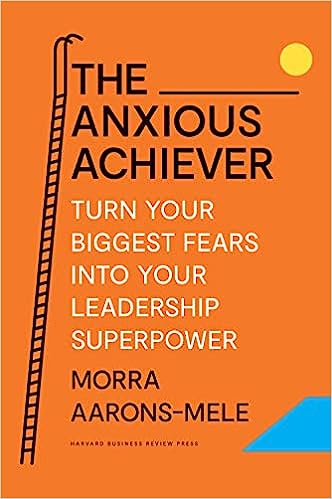A multitude of things can make us anxious at work: a demanding boss, a lazy co-worker, a tough assignment. But for some people, anxiety is a constant companion, even in situations where there’s no obvious reason for it. And it often goes hand in hand with a desire to achieve.
This connection was recognized by the entrepreneur and communications expert Morra Aarons-Mele and she explores it in her hit podcast, The Anxious Achiever.
Anxiety’s Upside
She has now written a book of that name, subtitled “Turn Your Biggest Fears Into Your Leadership Superpower.” When I spoke to Aarons-Mele for our latest Mind Tools Expert Interview, she explained how anxiety can be a double-edged sword.
Here’s an excerpt. (You can stream the audio clip below or read a transcript here.)
For the anxious among us, it’s nice to know there can be an upside to the uncomfortable symptoms we often feel: racing heart, churning stomach, aching brain.
The trick is to “look our anxiety in the face and work with it,” Aarons-Mele says. Then we can harness the powerful drivers of those symptoms to produce our best work and reduce our discomfort.
Freeing Yourself From Thought Traps

In her book, she shines a light on what causes anxiety in conscientious people, including negative self-talk, all-or-nothing thinking, catastrophizing, and overthinking. In each case, she offers tips for escaping those thought traps.
For example, if you can recognize that you’re catastrophizing, you can actively try to interrupt those thoughts with more rational ones.
“I can literally try to replace the instantaneous thought of, ‘It’s all your fault. You suck. You’re getting fired,’ with, ‘Okay, maybe this wasn’t your best month. Let’s look at the data. Let’s try to just bring some more neutral information in. Let’s try to breathe. Even if you did get fired, let’s play out the worst-case scenario and see what would happen’,” she says. “That kind of interruption for me – and it’s evidence based – is really powerful.”
Perfectionism Is Anxiety
As a recovering perfectionist myself, I was interested that Aarons-Mele devotes a whole chapter to perfectionism.
When I asked her why, she said that perfectionism is a common problem for anxious achievers, and it’s often misunderstood.
“Perfectionism, I learned in my study, is not always being amazing and giving everything you’ve got and creating the most incredible product ever made. Perfectionism’s anxiety: it’s a sense that, ‘If I am not perfect, I’m not worth it’,” she told me.
The Terrifying Typo
On the face of it, the job of a writer and editor aligns positively with perfectionism. Being exceptionally careful about facts, grammar usage and spelling is the sweet spot of editorial work. In fact, the more perfectionist an editor is, the better – or so it always seemed to me.
When I was editor-in-chief of a small weekly newspaper, I wore my perfectionism like a badge of honor. I invented processes for myself that demanded a lot of time and high levels of concentration. If I was editing an article, I’d never read it fewer than three times, proudly announcing to whoever would listen that I’d found something new to correct every time.
But this extreme attention to detail wasn’t always helpful. I remember finding a typo in the small print of an advertising supplement freshly delivered from the printer. I was horrified. I picked up a pair of scissors and scratched at the misplaced letter until it was obliterated in a scruff of newsprint. Sleepless nights followed, punctuated by harebrained “solutions” like pulping the lot and reprinting a new, perfect batch of magazines.
Remembering this incident now, I still feel mortified about the error, even though my rational mind reminds me that, as far as I know, no one noticed it. If they did, it had no consequences, which is more or less the same as no one noticing.
Having heard Aarons-Mele’s take on this particular thought trap, I can see that my response to the typo was multifaceted. It was about producing the best product I could, but it was also about proving my own worth, to myself and other people. My motivation got tangled up, so that when I saw that tiny mistake in print, it registered with me as a total personal fail.
Let’s Be Excellent
Perfectionists need to stand back and give themselves an easier time of it, Aarons-Mele believes. We control the urge to be perfect, not the other way around.
“If we can moderate [perfectionism] and get it out of our way, as one of my favorite interviews in the book – Dr Thomas Greenspan – says, ‘We’ll still be excellent, just without all the attending anxiety’,” she reflects.
But anxious achievers, don’t worry! This isn’t about lowering our standards. It’s about accepting that life happens and mistakes can slip through. And that “excellent” is – truly – as worthy an outcome as “perfect.”
Listen to the Full Story
You can listen to or read my full 30-minute interview with Morra Aarons-Mele if you’re a Mind Tools member or if your employer is a Mind Tools for Business licensee.
If you’re not already a member, join Mind Tools now to gain unlimited access to 2,400+ resources, including our back catalog of 200+ Expert Interviews. Or find out more about Mind Tools for whole organizations, big or small, by contacting our enterprise team.
Meanwhile, catch more excerpts and insights from my guests by searching our Expert Interview blog topic and by signing up free to the Mind Tools Expert Voices podcast.



